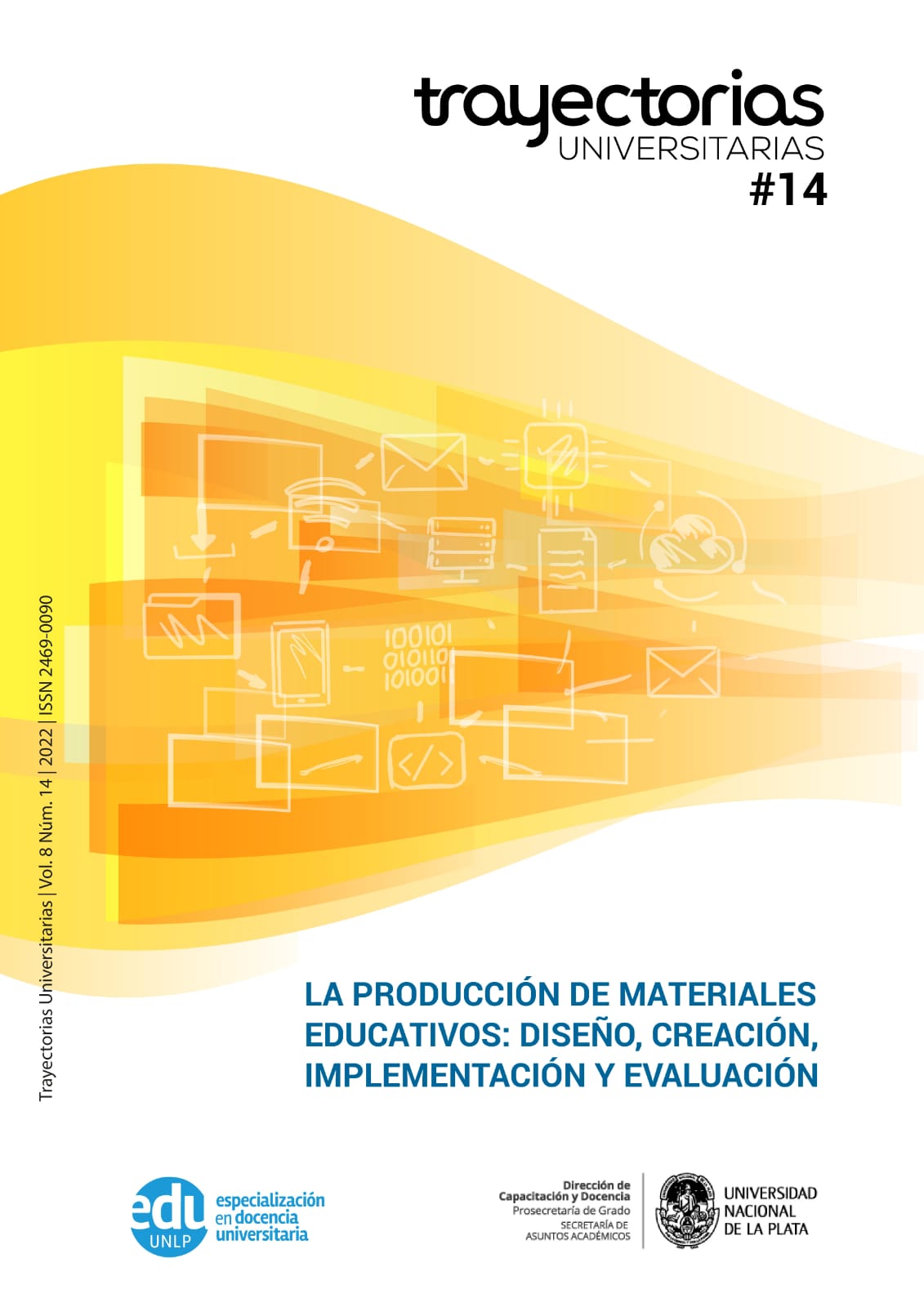An experience of literary adaptation for the intermediate English courses for adults in Escuela de Lenguas (UNLP)
DOI:
https://doi.org/10.24215/24690090e088Keywords:
literature, english teaching, adaptationAbstract
Using literature as a pedagogical resource in the English classroom promotes language acquisition, providing authentic contexts of language in use which can be exploited both linguistically and culturally.
At beginner levels, the scope of language comprehension motivates teachers to use literary texts pre-designed as didactic input for the English language class. Most abridged versions of texts are not always based on contemporary, authentic and attractive literature, which prompted us to adapt literary texts that meet these premises, and thus encourage our students’ contact with meanings more relevant to their realities. As a task of the internship at Escuela de Lenguas, we intended to adapt the story “A Temporary Matter” by the American-Indian writer Jhumpa Lahiri to an intermediate level in order to address it in the corresponding English course for adults (Level 4).
This paper departs from the importance of literature as a pedagogical input in the English class; it then reviews the strategies developed to adapt this story and our experience throughout this journey in its different stages: the beginning of the task, the search for bibliography and text adaptation techniques, and the dynamics of the process.
Downloads
Metrics
References
Baum, G. V. (2021, Noviembre). Diseño de materiales decoloniales situados para la enseñanza de inglés como lengua otra. Cuadernos de la ALFAL, 13(2), 133–168. https://www.mundoalfal.org/sites/default/files/revista/13_2_cuaderno_009.pdf
Charyulu, M (2018). Complications in reading abridged texts: A study on cultural destruction by ELLs in meaning-making process. Disponible en https://www.researchgate.net/publication/326158348_COMPLICATIONS_IN_READING_ABRIDGED_TEXTS_A_STUDY_ON_CULTURAL_DESTRUCTION_BY_ELLs_IN_MEANING-MAKING_PROCESS
Crossley, S., Allen, D. y Mcnamara, D. (2012). Text simplification and comprehensible input: A case for an intuitive approach. Language Teaching Research, 16 (1), 89-108.
Daniels, H. (1994). Literature Circles: Voice and Choice in the Student Centered Classroom. York, Maine: Stenhouse Publishers.
Daniels, H. (2002). Literature Circles: Voice and Choice in Book Clubs and Reading Groups.2nd. edition. U.S: Stenhouse Publishers.
Daniels, H. (2006). What's the Next Big Thing with Literature Circles. Voices from the Middle, 13(4) 10-15. Urbana, Illinois: NCTE.
Furr, M. (2004). Literature circles for the EFL classroom, Proceedings of the 2003 TESOL Arabia Conference. Dubai: TESOL Arabia.
Lang, T. (2017). How to shorten a text by up to 30% and improve clarity without losing information. In: Medical Writing. EMWA Journal.
Lahiri, J. (1999). The Interpreter of Maladies. Flamingo.
Petersen, S.E. y Ostendorf, M. (2007). Text Simplification for Language Learners: A Corpus Analysis. https://pdfs.semanticscholar.org/36eb/5b36edac70cbc23507b825a3cec2e95d6b05.pdf
Pérez, C. (2020). Círculos literarios: el poder de la lectura en el desarrollo de competencias. https://ojs.uv.es/index.php/foroele/article/view/17322/17066
Rosenblatt, L. M. (2010). El modelo transaccional. https://lecturayescrituraunrn.files.wordpress.com/2013/08/unidad-1-complementaria-rosemblatt.pdf
Downloads
Published
How to Cite
Issue
Section
License
Copyright (c) 2022 María Constanza Massano, Ailen Ungaro, Erica Scorians

This work is licensed under a Creative Commons Attribution-NonCommercial-ShareAlike 4.0 International License.
La aceptación de un original por parte de la revista implica la cesión no exclusiva de los derechos patrimoniales de los/as autores/as en favor del editor, quien permite la reutilización, luego de su edición (postprint), bajo una Licencia Creative Commons Atribución-NoComercial-CompartirIgual 4.0 Internacional (CC BY-NC-SA 4.0).
Acorde a estos términos, el material se puede compartir (copiar y redistribuir en cualquier medio o formato) y adaptar (remezclar, transformar y crear a partir del material otra obra), siempre que a) se cite la autoría y la fuente original de su publicación (revista y URL de la obra), b) no se use para fines comerciales y c) se mantengan los mismos términos de la licencia.
La cesión de derechos no exclusivos implica que luego de su edición (postprint) en Trayectorias Universitarias los/as autores/as pueden publicar su trabajo en cualquier idioma, medio y formato; en tales casos, se solicita que se consigne que el material fue publicado originalmente en esta revista.
Tal cesión supone, también, la autorización de los/as autores/as para que el trabajo sea cosechado por SEDICI, el repositorio institucional de la Universidad Nacional de La Plata, y sea difundido en las bases de datos que el equipo editorial considere adecuadas para incrementar la visibilidad de la publicación y de sus autores/as.
Asimismo, la revista incentiva a los/as autores/as para que luego de su publicación en Trayectorias Universitarias depositen sus producciones en otros repositorios institucionales y temáticos, bajo el principio de que ofrecer a la sociedad la producción científica y académica sin restricciones contribuye a un mayor intercambio del conocimiento global.





















